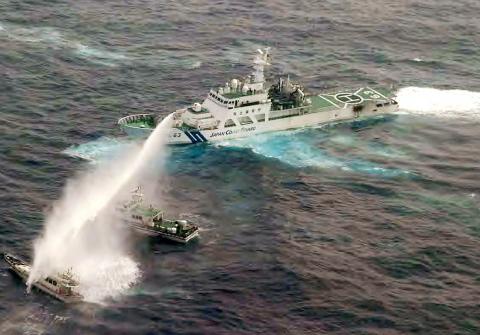A new report from the Congressional Research Service (CRS) raises a potentially difficult question for Taipei about its current relationship with Beijing.
“One issue for US policy concerns trends across the Taiwan Strait since 2008,” says the report, made public on Monday.
The report asks whether Taiwan’s moves to grow closer to the People’s Republic of China (PRC) have “created a greater willingness” in Taipei to cooperate with Beijing on issues “in which it sees their interests as aligned.”

Photo: AFP
In particular, the new report — entitled Maritime Territorial Disputes in East Asia — suggests that the US Congress should examine Taiwan-China cooperation in the East China Sea.
“Some analysts argue that there is an issue for US policymakers surrounding whether Taiwan coordinated with the PRC in asserting sovereignty of the Senkaku Islands [Diaoyutai Islands (釣魚台)] against Japan amid rising tension in September 2012,” the report says.
Written by specialist in Asian security affairs Shirley Kan and specialists in Asian affairs Ben Dolven and Mark Manyin, the report is likely to get special attention from the House Committee on Foreign Affairs and the Senate Committee on Foreign Relations.
The report says China has urged cooperation over the islands to advance cross-strait ties, but, to date, Taipei officials have denied cooperating with Beijing.
“Even without explicit coordination, the parallel actions of the PRC and Taiwan in the current East China Sea flareup have added pressure against Japan,” the report says.
It says that both China and Taiwan have deployed government patrol ships and military assets that have “raised concerns about the potential for accidental collisions and the escalation of tensions.”
On Sept. 25 last year, Taiwan deployed 12 coast guard ships that escorted 60 fishing boats and fired water cannons at Japan’s patrol ships.
“Furthermore, Taiwan dispatched military systems sold by the United States during the incident,” the report says.
The US Congress will face many questions arising from maritime territorial disputes in East Asia, the report adds.
The sovereignty disputes themselves are so difficult and raise such wide-ranging issues for US policy that managing them will touch on congressional oversight of US President Barack Obama’s diplomatic actions in Asia, it says.
The report says that Congress will have to consider the Obama administration’s military posture and budgets, and “its search for ways to limit the potential for conflict and create a more stable environment in the region.”

INVESTIGATION: The case is the latest instance of a DPP figure being implicated in an espionage network accused of allegedly leaking information to Chinese intelligence Democratic Progressive Party (DPP) member Ho Jen-chieh (何仁傑) was detained and held incommunicado yesterday on suspicion of spying for China during his tenure as assistant to then-minister of foreign affairs Joseph Wu (吳釗燮). The Taipei District Prosecutors’ Office said Ho was implicated during its investigation into alleged spying activities by former Presidential Office consultant Wu Shang-yu (吳尚雨). Prosecutors said there is reason to believe Ho breached the National Security Act (國家安全法) by leaking classified Ministry of Foreign Affairs information to Chinese intelligence. Following interrogation, prosecutors petitioned the Taipei District Court to detain Ho, citing concerns over potential collusion or tampering of evidence. The

NEGOTIATIONS: Taiwan has good relations with Washington and the outlook for the negotiations looks promising, Minister of Economic Affairs J.W. Kuo said Taiwan’s GDP growth this year is expected to decrease by 0.43 to 1.61 percentage points due to the effects of US tariffs, National Development Council (NDC) Minister Paul Liu (劉鏡清) said at a meeting of the legislature’s Economics Committee in Taipei yesterday, citing a preliminary estimate by a private research institution. Taiwan’s economy would be significantly affected by the 32 percent “reciprocal” tariffs slapped by the US, which took effect yesterday, Liu said, adding that GDP growth could fall below 3 percent and potentially even dip below 2 percent to 1.53 percent this year. The council has commissioned another institution

NEGOTIATIONS: The US response to the countermeasures and plans Taiwan presented has been positive, including boosting procurement and investment, the president said Taiwan is included in the first group for trade negotiations with the US, President William Lai (賴清德) said yesterday, as he seeks to shield Taiwanese exporters from a 32 percent tariff. In Washington, US Trade Representative Jamieson Greer said in an interview on Fox News on Thursday that he would speak to his Taiwanese and Israeli counterparts yesterday about tariffs after holding a long discussion with the Vietnamese earlier. US President Donald Trump on Wednesday postponed punishing levies on multiple trade partners, including Taiwan, for three months after trillions of US dollars were wiped off global markets. He has maintained a 10 percent

TRADE: The premier pledged safeguards on ‘Made in Taiwan’ labeling, anti-dumping measures and stricter export controls to strengthen its position in trade talks Products labeled “made in Taiwan” must be genuinely made in Taiwan, Premier Cho Jung-tai (卓榮泰) said yesterday, vowing to enforce strict safeguards against “origin laundering” and initiate anti-dumping investigations to prevent China dumping its products in Taiwan. Cho made the remarks in a discussion session with representatives from industries in Kaohsiung. In response to the US government’s recent announcement of “reciprocal” tariffs on its trading partners, President William Lai (賴清德) and Cho last week began a series of consultations with industry leaders nationwide to gather feedback and address concerns. Taiwanese and US officials held a videoconference on Friday evening to discuss the